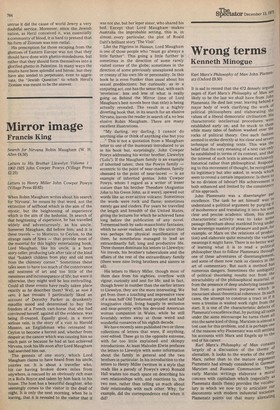Mirror image
Francis King
Search for Nirvana Robin Maugham (W. H. Allen £4.50) Letters to His Brother Llewelyn Volume 1 1902-1925 John Cowper Powys (Village Press £2.25) Letters to Henry Miller John Cowper Powys. (Village Press £0.85) When Robin Maugham writes about his search for 'Nirvana', he means by that word, not the extinction of selfhood which is the aim of the mystic, but the heightening of experience which is the aim of the hedonist. In search of that heightening of experience, he has travelled widely and adventurously, as his uncle, Somerset Maugham, did before him; and it is these travels — to Morocco, to Ceylon, to the strange oasis of Siwa — that provide most of the material for this highly entertaining book. Lord Maugham, like his uncle, is a born story-teller, producing tale after tale of the kind that "holdeth children from play and old men from the chimney corner." Sometimes these tales seem to have too much of the contrivance and neatness of art and too little of the messiness and inconsequence of life; but were it otherwise, they might well be less enthralling. Could all these events have really taken place exactly as he describes them? Well, se non e vero, e ben trovato. I particularly liked an account of Dorothy Parker in drunkenly maudlin mood and determined to buy the freedom of a French cart-horse that she had convinced herself, against all the evidence, was being ill-treated. Equally good, in a more serious vein, is the story of 'a visit to Harold Musson, an Englishman who retreated to Ceylon to become a hermit and, whether from despair at the cancer which was causing him so much pain or because he had at last achieved Nirvana, took his life soon after Lord Maugham had searched him out.
The genesis of one story, which Lord Maugham claims to have heard from his uncle, puzzles me. It is about a traveller who, his car having broken down miles from anywhere, is rescued by an obviously rich man in a Rolls Royce and taken by him back to his house. The host has a beautiful daughter, who seemingly comes to the visitor in the dead of night. It is only the next morning, when he is leaving, that it is revealed to the visitor that it was not she, but her leper sister, who shared his bed. Except that Lord Maugham makes Australia the improbable setting, this is, in almost every particular, the plot of Roald Dahl's brilliant story 'The Visit'.
Like the Pilgrims in Hassan, Lord Maugham is one of those people who "must go always a little further". This going a little further is sometimes in the direction of some rarely visited corner of the globe; sometimes in the direction of some previously unexplored nook or cranny of his own life or personality. In this book he is even franker than usual about his sexual predilections; but curiously, as in a conjuring act, one has the sense that, with each 'revelation', less and less of what is really going on Behind the Mirror (one of Lord Maugham's best novels bore that title) is being actually revealed. The result is a highly diverting book that, in its search for an elusive Nirvana, leaves the reader in search of a no less elusive Robin Maugham. There are many excellent illustrations.
"My darling, my darling, I cannot do anything else or think of anything else but you ..." This is not a quotation from a Maugham letter to one of the inamorati introduced to us in his book but, surprisingly, John Cowper Powys addressing his writer brother, Llewelyn ('Lulu'). If the Maugham family is an example of inherited talent, then the Powys family — eccentric to the point of near-madness, family obsessed to the point of near-incest — is an example of inherited genius. John Cowper Powys, whom I regard as a writer of lesser stature than his brother Theodore (Augustus John to his Gwen John, as it were), spewed out words like an ever-active volcano. Sometimes the words were rock and flame; sometimes merely gas and cinders. For years he travelled the length and breadth of the United States, giving the lectures for which he achieved fame long before the publication of any novel. Tormented both by sado-masochistic fantasies, which he never realised, and by the ulcer that was perhaps the physical manifestation of them, he nonetheless managed to lead an extraordinarily full, long and productive life. Three themes dominate his letters to Llewelyn: his travels, his brother's tuberculosis and the affairs of the rest of the extraordinary family (there were nine living brothers and sisters in all).
His letters to Henry Miller, though most of them date from his eighties, overflow with vigour, curiosity and zest for life; and in fact, though fewer in number than the earlier letters to Llewelyn, they are the more interesting. We get from them a touching and impressive view of a man half Old Testament prophet and half imaginative child, living happily in seclusion and near-poverty with his devoted American woman companion in Wales, while he still feverishly writes away at those weird and. wonderful romances of his eighth decade.
We have recently seen published two or three collections of letters that were, if anything, over-edited. These go to the opposite extreme, with far too little explained and skimpy introductions. At least Malcolm Elwin prefaces the letters to Llewelyn with some information about the family in general and the two brothers in particular. In his introduction to the letters to Henry Miller (written in a style that reads like a parody of Powys's own) Ronald Hall wastes too much space on describing his own relationships with, and reactions to, the two men, rather than telling us much about their relationship with each other, Why, for example, did the correspondence end when it did?.

































 Previous page
Previous page